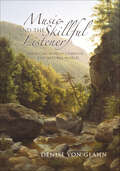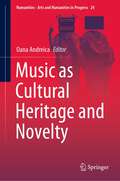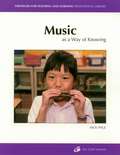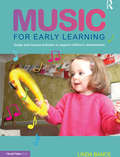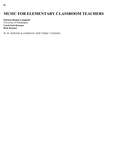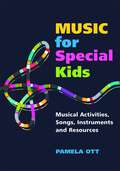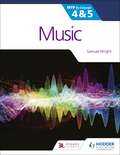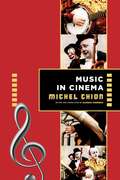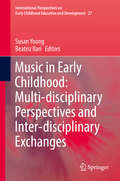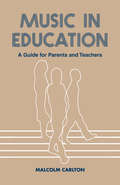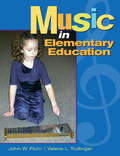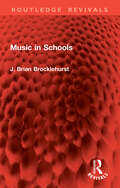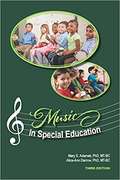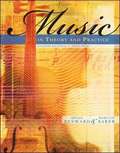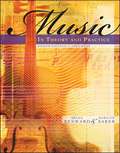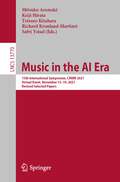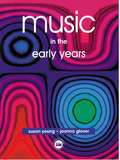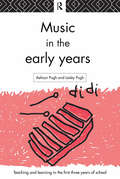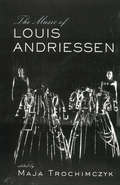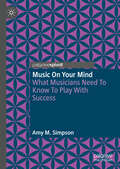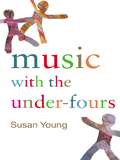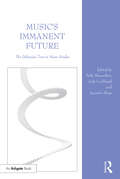- Table View
- List View
Music and the Skillful Listener: American Women Compose the Natural World (Music, Nature, Place)
by Denise Von GlahnFor Denise Von Glahn, listening is that special quality afforded women who have been fettered for generations by the maxim "be seen and not heard." In Music and the Skillful Listener, Von Glahn explores the relationship between listening and musical composition focusing on nine American women composers inspired by the sounds of the natural world: Amy Beach, Marion Bauer, Louise Talma, Pauline Oliveros, Joan Tower, Ellen Taaffe Zwilich, Victoria Bond, Libby Larsen, and Emily Doolittle. Von Glahn situates "nature composing" among the larger tradition of nature writing and argues that, like their literary sisters, works of these women express deeply held spiritual and aesthetic beliefs about nature. Drawing on a wealth of archival and original source material, Von Glahn skillfully employs literary and gender studies, ecocriticism and ecomusicology, and the larger world of contemporary musicological thought to tell the stories of nine women composers who seek to understand nature through music.
Music as Cultural Heritage and Novelty (Numanities - Arts and Humanities in Progress #24)
by Oana AndreicaThis book provides a multifaceted view on the relation between the old and the new in music, between tradition and innovation. This is a much-debated issue, generating various ideas and theories, which rarely come to unanimous conclusions. Therefore, the book offers diverse perspectives on topics such as national identities, narrative strategies, the question of musical performance and musical meaning. Alongside themes of general interest, such as classical repertoire, the music of well-established composers and musical topics, the chapters of the book also touch on specific, but equally interesting subjects, like Brazilian traditions, Serbian and Romanian composers and the lullaby. While the book is mostly addressed to researchers, it can also be recommended to students in musicology, ethnomusicology, musical performance, and musical semiotics.
Music as a Way of Knowing
by Nick PageNick Page loves to make and share music with his students, and it's likely that you will too by the time you've finished his passionate, thought-provoking book. You will also have developed a new understanding of and appreciation for the role music can play in supporting learners. A music educator and song leader who has devoted his professional life to helping people of all ages realize that they are "capable of great miracles through the simple, yet powerful, act of singing," Nick is particularly devoted to multicultural music and works diligently to promote music of diverse cultures. Rich with ideas on how to use music in the classroom, Music as a Way of Knowing will appeal especially to classroom teachers who are not musicians, but who enjoy and learn from music and want to use it with their students. Indeed, Nick reveals the truth of the Zimbabwean adage: "If you can talk, you can sing. If you can walk, you can dance. " Nick provides simple instructions for writing songs, using music to support learning across the curriculum, teaching singing effectively, and finding good songs. He assures you that with time, all students can sing well. The good news is that once you've read this book, you'll have the confidence to trust yourself-and your students-to sing and learn well through the joy and power of music.
Music for Early Learning: Songs and musical activities to support children's development
by Linda BanceIs my singing good enough? What should I do with instruments? How can I create a rich and exciting musical environment which will allow for both child and adult led musical activity? Singing, dancing and music-making comes naturally to young children, but we as adults often lack confidence in our musical ability. This easily accessible book will help you to realise that everyone can be a creative music-maker with young children. It aims to inspire you to take young children’s enthusiasm for music and create a musically rich environment that supports all areas of learning and development and at the same time celebrate music for music’s sake. Packed with activities, songs and musical games, this book includes: Recognising musical development in young children and the benefits of music-making in the early years Advice on inclusive practice Guidance on using musical instruments Ways to develop your own musicality Help with planning and assessment Chapters linking musical activities to each area of learning and development How to create a balance between adult-led and child-initiated activities Music for Early Learning also includes a CD containing 23 songs and listening activities linked to each area of development which can be used as a standalone resource or alongside the music manuscript and Guitar and Ukulele tabs provided, as well as lyrics to each of the songs. This practical text will help you to realise the wonderful opportunities that music can offer young children and is an ideal resource for Early Years Practitioners, Early Years consultants and trainnee teachers, as well as those on Nursery Nursing and Childcare courses at Further and Higher education levels.
Music for Elementary Classroom Teachers
by Patricia Shehan Campbell Carol Scott-Kassner Kirk KassnerLearn how to use the power of music to enhance other subjects. Written for both elementary education majors and K-6 classroom teachers, the text is rooted in cognitive research on children’s development. <p><p>The book offers myriad instructional plans that weave songs, dances, and carefully constructed listening experiences into subjects ranging from language arts and social studies to mathematics, science, and the arts. It also provides opportunities for engaging children in expressive-creative practices.
Music for the IB MYP 4&5: MYP by Concept
by Samuel WrightA concept-driven and assessment -focused approach to Music teaching and learning.- Approaches each chapter with statements of inquiry framed by key and related concepts, set in a global context.- Supports every aspect of assessment using tasks designed by an experienced MYP educator.- Differentiates and extends learning with research projects and interdisciplinary opportunities.- Applies global contexts in meaningful ways to offer an MYP Music programme with an internationally-minded perspective.Also available Student eTextbook 9781510475533Whiteboard eTextbook 9781510475540Teacher's Pack 9781510478145
Music for the IB MYP 4&5: MYP by Concept
by Samuel WrightA concept-driven and assessment -focused approach to Music teaching and learning.- Approaches each chapter with statements of inquiry framed by key and related concepts, set in a global context.- Supports every aspect of assessment using tasks designed by an experienced MYP educator.- Differentiates and extends learning with research projects and interdisciplinary opportunities.- Applies global contexts in meaningful ways to offer an MYP Music programme with an internationally-minded perspective.Also available Student eTextbook 9781510475533Whiteboard eTextbook 9781510475540Teacher's Pack 9781510478145
Music in Cinema (Film and Culture Series)
by Michel ChionMichel Chion is renowned for his explorations of the significance of frequently overlooked elements of cinema, particularly the role of sound. In this inventive and inviting book, Chion considers how cinema has deployed music. He shows how music and film not only complement but also transform each other.The first section of the book examines film music in historical perspective, and the second section addresses the theoretical implications of the crossover between art forms. Chion discusses a vast variety of films across eras, genres, and continents, embracing all the different genres of music that filmmakers have used to tell their stories. Beginning with live accompaniment of silent films in early movie houses, the book analyzes Al Jolson’s performance in The Jazz Singer, the zither in The Third Man, Godard’s patchwork sound editing, the synthesizer welcoming the flying saucer in Close Encounters of the Third Kind, and the Kinshasa orchestra in Felicité, among many more. Chion considers both original scores and incorporation of preexisting works, including the use and reuse of particular composers across cinematic traditions, the introduction of popular music such as jazz and rock, and directors’ attraction to atonal and dissonant music as well as musique concrète, of which he is a composer.Wide-ranging and original, Music in Cinema offers a welcoming overview for students and general readers as well as refreshingly new and valuable perspectives for film scholars.
Music in Context: Manuscripts and Medieval Song
by Deeming, Helen and Leach, Elizabeth Eva Helen Deeming Elizabeth Eva LeachThe manuscript sources of medieval song rarely fit the description of 'songbook' easily. Instead, they are very often mixed compilations that place songs alongside other diverse contents, and the songs themselves may be inscribed as texts alone or as verbal and musical notation. This book looks afresh at these manuscripts through ten case studies, representing key sources in Latin, French, German, and English from across Europe during the Middle Ages. Each chapter is authored by a leading expert and treats a case study in detail, including a listing of the manuscript's overall contents, a summary of its treatment in scholarship, and up-to-date bibliographical references. Drawing on recent scholarly methodologies, the contributors uncover what these books and the songs within them meant to their medieval audience and reveal a wealth of new information about the original contexts of songs both in performance and as committed to parchment.
Music in Early Childhood: Exploring the Theories, Philosophies and Practices
by Susan YoungMusic in Early Childhood is an accessible and practical handbook, which introduces theories and pedagogical approaches for early childhood music education from birth to 8 years and explains their practical application.Understanding the theories and philosophies behind music education and how these translate into practice is the key to being an effective music educator with young children. This book provides a comprehensive overview of these theories and philosophies. Organised in an easy-to-read format that summarises each approach and theory, the book clearly maps out how these theories are applied in present-day practice. Also included are a wide range of helpful practical examples and activity ideas based on the work of expert educators. This book aims: to inform educators of theories and philosophies of learning and teaching in music education for young children and what they look like in practice. to inform educators of the history and breadth of music education methods, and how they relate to the present. to help educators develop a theory-informed conception of music education that enables them to make informed decisions about the design and direction of their practice. This book is an essential resource for all early childhood music educators, experienced or just starting out, who want to develop their practice in working with young children as effectively as possible. It will promote an enquiring, reflective and imaginative approach to practice.
Music in Early Childhood: Multi-disciplinary Perspectives And Inter-disciplinary Exchanges (International Perspectives on Early Childhood Education and Development #27)
by Susan Young Beatriz IlariThis book examines four main areas of music in early childhood: the traditions of music for young children, their capacities for music, the way they make music with others, and constructed and mediated musical childhoods. It studies several themes in detail, including music making in the home and family life, various musical experiences in schools, day cares, and the community at large in several locations around the globe. It looks at technology and diverse musical repertoires, as well as innovative pedagogies, children’s agency, and brain research. Expanding on the knowledge bases on which early childhood music education typically draws, the book brings together contributions from a range of authors from diverse fields such as education, psychology, sociology, cultural studies, anthropology, philosophy, ethnomusicology, and the neurosciences. The end result is a volume that offers a broad and contemporary picture of music in early childhood.
Music in Education: A Guide for Parents and Teachers
by Malcolm CarltonFirst published in 1987. This book is for parents, teachers and others involved in the education of children. It aims to provide, in easily understood language, a guide to music in education; it includes some historical detail, but is mostly concerned with what actually occurs or ought to occur in the class#2;room in both primary and secondary schools.
Music in Elementary Education
by John Flohr Valerie TrollingerBased on the National Standards, this text is divided into three parts. Part one, Foundations, covers the rationale for a Music Education program in the elementary years; meaning and musical experience; and elements and kinds of music. Part two– Music Elements, Curriculum and Avenues to Music Learning–covers curriculum development; music for special needs students; avenues to music learning and historic and contemporary approaches. Part three–Musical Experiences– is grouped by avenues of music learning and grades. Thanks to years of thorough research, Music in Elementary Education promises is a standard text in the field.
Music in Schools (Routledge Revivals)
by J. Brian BrocklehurstFirst published in 1962, Music in Schools discusses all aspects of the teaching of singing in schools. The most effective methods of laying the foundations of musicianship are fully dealt with and ways are considered in which movements, speech, and simple instrumental playing can be used to develop children’s musical literacy, aural perception, and creative ability.Attention is given to the development of children’s taste for, and in, music (including jazz and popular music) and stress is laid on the importance of children as active participants in the appreciation lesson, not simply passive spectators. The place of instrumental music in schools is considered fully and methods of teaching the playing of percussion instruments (rhythmic and melodic), recorders, bamboo pipes, harmonicas, and melodicas are examined. Suggestions are made concerning the formation of school brass bands and piano, string and wind instrument classes; advice is also given on the training and conducting of school orchestras.Other subjects which receive attention include continuity in school music, the value of musical aptitude tests, the use of films and other visual aids, the provision of equipment for music rooms in schools and the place of music in the education of mentally and physically handicapped children.
Music in Special Education
by Mary Adamek Alice-Ann DarrowThe field of special education has changed greatly over the past four decades. With many of the changes, the responsibilities of music educators and music therapists have also changed. Music professionals in schools must keep abreast of related laws, terminologies, special education initiatives, and current instructional approaches, materials, and technologies in order to meet the needs of students with disabilities. Inclusive education has contributed to the changed roles of music therapists and music educators in the classroom. Music in Special Education (third edition) provides an introduction to the field of special education, and the current roles of music education and music therapy in the lives of students with disabilities and their families. <p><p> This updated edition of Music in Special Education explains important concepts in special education that are important for interdisciplinary communication and effective teamwork. Part I introduces the reader to the historical and instructional foundations of music in special education including major topics and developments in the field of special education, important terminology, and curricular issues. Part II introduces the characteristics of specific disabilities, the educational implications of these disabilities, appropriate instructional adaptations, as well as music education and music therapy approaches used with students who have these disabilities. Part III addresses the roles music educators and music therapists play in family and community lives of students with disabilities. <p> Music in Special Education (third edition) is an essential text to prepare effective future music educators and music therapists working in special education.
Music in Theory and Practice, Volume 1 (8th edition)
by Bruce Benward Marilyn SakerThis best-selling text gives majors a solid foundation in the theory of music - generally and throughout history. It strengthens their musical intuition, builds technical skills, and helps them gain interpretive insights. The two-volume format ensures exhaustive coverage and maximum support for students and faculty alike. Volume I serves as a general introduction to music theory while volume II offers a survey of the theoretical underpinnings of musical styles and forms from Gregorian Chant through the present day.
Music in Theory and Practice, Volume 2 (8th edition)
by Bruce Benward Marilyn SakerThis best-selling text gives majors a solid foundation in the theory of music - generally and throughout history. It strengthens their musical intuition, builds technical skills, and helps them gain interpretive insights. The two-volume format ensures exhaustive coverage and maximum support for students and faculty alike. Volume I serves as a general introduction to music theory while volume II offers a survey of the theoretical underpinnings of musical styles and forms from Gregorian Chant through the present day.
Music in the AI Era: 15th International Symposium, CMMR 2021, Virtual Event, November 15–19, 2021, Revised Selected Papers (Lecture Notes in Computer Science #13770)
by Mitsuko Aramaki Richard Kronland-Martinet Sølvi Ystad Keiji Hirata Tetsuro KitaharaThis book constitutes the refereed proceedings and revised selected papers from the 15th International Symposium on Music in the AI Era, CMMR 2021, which took place during November 15–19, 2021 as a virtual event. The 24 full papers included in this book were carefully reviewed and selected from 48 submissions. The papers are grouped in thematical sessions on Music technology in the IA era; Interactive systems for music; Music Information Retrieval and Modeling; and Music and Performance Analysis.
Music in the Early Years
by Susan Young Joanna GloverMusic in the Early Years is for teachers working across the 3 to 8 age phase who want to make music integral to the life of the nursery and early years classroom.Music has often been taught as if it were different, something outside the mainstream curriculum, with teaching approaches quite at odds with early years work. This book takes children's development as its basis and works towards building a music pedagogy within early years practice. A readiness to listen, observe and reflect is central to the practice which threads through the book.Based on the authors' extensive experience and drawing on that of other teachers and researchers, lots of well-tried, practical ideas show how teachers, parents and carers can help children fulfil their music potential. Sample activities model ways of working with children and have been written in such a way that they can be substituted with other material and adapted for further use. Earlier and later stages of learning and progression are described as a basis for matching activities with children's learning needs, as well as a companion book, Primary Music: Later Years.
Music in the Early Years (Teaching And Learning In The Early Years Ser.)
by Aelwyn Pugh Lesley PughResearch findings repeatedly show that music is one of the subjects which teachers feel least confident to tackle. There are many reasons for this, not least being the lack of appropriate guidance and training. This book is designed to help overcome these problems by providing class teachers with clear advice on how to plan, resource and deliver a comprehensive programme which will challenge their pupils and enable them to progress and meet national requirements. The book includes examples and activities which can be used as a basis for in-service training within schools, particularly for teachers who regard themselves as non-specialists.
Music of Louis Andriessen (Studies In Contemporary Music And Culture Ser.)
by Maja TrochimczykThis book presents the musician in dialog with a Polish-Canadian musicologist and three of his Dutch friends and collaborators, Reinbert de Leeuw, Elmer Schönberger and Frits van der Waa. Topics include his artistic evolution, his relationship to minimalism, his prevalent interest in mysticism and meaning, the use of quotation and writing for
Music on Your Mind: What Musicians Need to Know to Play with Success
by Amy M. SimpsonThis book provides musicians, students, and teachers a practical guide for optimal music learning, practice, memorization, and performance by the application of modern neuro-music research. Uncover the best, scientifically researched techniques, supported by researchers and musicians alike, that will empower you to learn thoroughly, practice optimally, and perform at your best. Do you know how people learn? Do you know how people improve motor-skills for playing an instrument? Do you know how to focus attention and stay motivated? Discover the essential answers you need to revitalize and optimize your daily work as a musician. By applying the best methods and knowing why they work, you, too, can create successful practice routines with positive, rewarding, results. Know the best techniques for preparing expert music performance. Learn how to play with success!
Music with the Under-Fours
by Susan YoungThe importance and value of music in the care and education of very young children is increasingly recognised. This book looks closely at early musical development and how this translates into ways of supporting the musical activity of babies, toddlers and young children, keeping in mind the diversity of preschool work. Key topics include: pre- and post-natal musical experience musical parenting lullabies and play songs baby music sessions toddlers' music play songs, musical games and other activities young children's singing music play with instruments listening working with adults to develop musical opportunities. This text provides a valuable synthesis of recent thinking in this area, as well as practical suggestions for fostering creativity through musical activities. An original and inspiring book which will be welcomed by anyone responsible for the care and education of preschool children.
Music's Immanent Future: The Deleuzian Turn in Music Studies
by Jennifer Shaw Sally Macarthur Judy LochheadThe conversations generated by the chapters in Music's Immanent Future grapple with some of music's paradoxes: that music of the Western art canon is viewed as timeless and universal while other kinds of music are seen as transitory and ephemeral; that in order to make sense of music we need descriptive language; that to open up the new in music we need to revisit the old; that to arrive at a figuration of music itself we need to posit its starting point in noise; that in order to justify our creative compositional works as research, we need to find critical languages and theoretical frameworks with which to discuss them; or that despite being an auditory system, we are compelled to resort to the visual metaphor as a way of thinking about musical sounds. Drawn to musical sound as a powerful form of non-verbal communication, the authors include musicologists, philosophers, music theorists, ethnomusicologists and composers. The chapters in this volume investigate and ask fundamental questions about how we think, converse, write about, compose, listen to and analyse music. The work is informed by the philosophy primarily of Gilles Deleuze and Felix Guattari, and secondarily of Michel Foucault, Julia Kristeva and Jean-Luc Nancy. The chapters cover a wide range of topics focused on twentieth and twenty-first century musics, covering popular musics, art music, acousmatic music and electro-acoustic musics, and including music analysis, music's ontology, the noise/music dichotomy, intertextuality and music, listening, ethnography and the current state of music studies. The authors discuss their philosophical perspectives and methodologies of practice-led research, including their own creative work as a form of research. Music's Immanent Future brings together empirical, cultural, philosophical and creative approaches that will be of interest to musicologists, composers, music analysts and music philosophers.
